One-On-One with Dr. George Scangos on COVID-19 and why the novel coronavirus is such a threat
Biotechnology companies, large and small, are working hard to more effectively treat and safely prevent the spread of COVID-19. For an episode of the I AM BIO Podcast, BIO President & CEO Jim Greenwood was joined by Dr. George Scangos, CEO of Vir and head of BIO’s Coronavirus Collaboration Initiative, to talk about why the COVID-19 virus is so deadly and what we can do to defeat it.
Greenwood: Describe what this virus does when it enters a human body. Why is it both so contagious and so deadly to at least a subset of our population?
Scangos: This virus is a particularly nasty one. It is a respiratory virus, so it infects your respiratory system, your nose, your nasopharynx, then it goes down into the lungs. It is especially lethal to cells called beta pneumocytes. These are cells in the lung that produce something called surfactant. The surfactant is like lubrication for the small passages in the lung through which air flows. If it doesn't have that lubrication because the cells that make it are killed by this virus, then they close and then the lungs don't take in air anymore.
Greenwood: They're not able to oxygenate the blood and then they end up on ventilators because they can't breathe on their own without that extra force?
Scangos: That's correct. People can't breathe on their own anymore. Their lungs aren't taking up the oxygen that they need. The other aspect of this virus is it sometimes can spread to the heart and cause cardiac damage, so people can die of heart failure. There are reports I've seen that it can also spread to the brain. This is a particularly nasty virus. It's sneaky in the sense that it can infect people and allow them to spread it before they even know they have it. People who are infected can be asymptomatic for a period of time, but they're infectious. People are walking around; they're infected with the virus. They're spreading it. They're infecting other people. They don't know they're infected. They feel okay. Maybe they have a little runny nose or some other very mild symptoms that you don't normally worry about. That's one of the characteristics of this virus that has made it spread so rapidly.
Greenwood: Is it fair to say some people will get this virus, never know they have it, essentially recover, and potentially have built up an immunity in the process?
Scangos: There certainly are many people who get the virus, don't know they had it, and have recovered. They are likely to have immunity. I think the question of how potent that immunity is and how long-lasting that immunity is is still an open question. But it is likely that those people who've had it and recovered have at least some degree of immunity.
Greenwood: Why are viruses so difficult? Why is it that we think that the coronavirus can be defeated in a much shorter timeframe?
Scangos: We hope we can. There’s certainly no guarantee that we can. Given the urgency of the situation, the number of people who are dying and who have long term health consequences is so significant, we have to do everything we can to try. Viruses have evolved over the years to be able to replicate and survive. There is a battle between the viruses and the human immune system. It really is like a war. The virus invades your body. Your body brings up defenses. There are different kinds of defenses it can mount. In many cases, over the years of evolution, there is a balance. You get colds, but you don't usually die from a cold. The virus infects you, it replicates, it can go infect more people, but it doesn't kill you. That is the most effective strategy for a virus, because it can keep infecting people without killing off the people it needs to replicate.
Greenwood: Tell us why this is so different [than the flu] and why we have to take all these extraordinary precautions.
Scangos: This coronavirus is much more deadly than the flu virus. If you call the mortality rate of this virus two or three percent, it's twenty or thirty times more deadly than the flu. If you did not take social distancing measures, and you just allowed this highly infectious virus to spread through the population, and you had 100 million people infected with a two percent death rate, that's two million people who will die. What could happen with this virus outweighs what happens with the flu that we have no choice. That's why we're all social distancing.
Greenwood: Within the past few weeks, your company has entered with breathtaking speed a succession of partnerships with several larger biotech companies, and with the NIH, to develop medicines to combat COVID-19.
Scangos: This is a crisis. People are dying every day. Every day matters. We are working literally as hard as we can, and as many hours in a day as we can stay up, stay awake, in order to accelerate bringing something forward that might actually help.
Tune in to the I AM BIO podcast by visiting www.bio.org/podcast or wherever you get your podcasts.
Learn more about what the biotech industry is doing to defeat COVID-19 at www.bio.org/coronavirus.






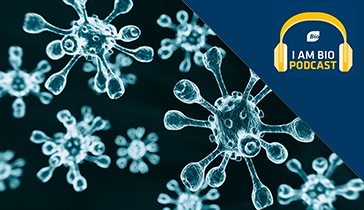
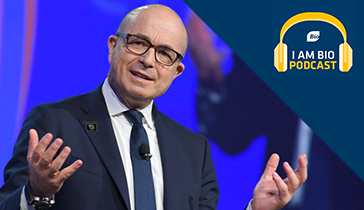
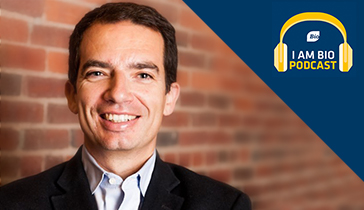
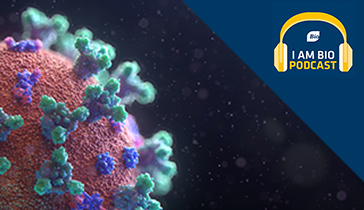
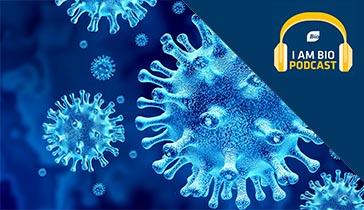







.png)


